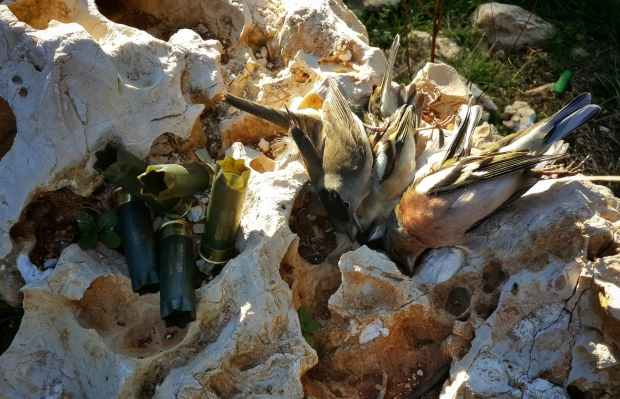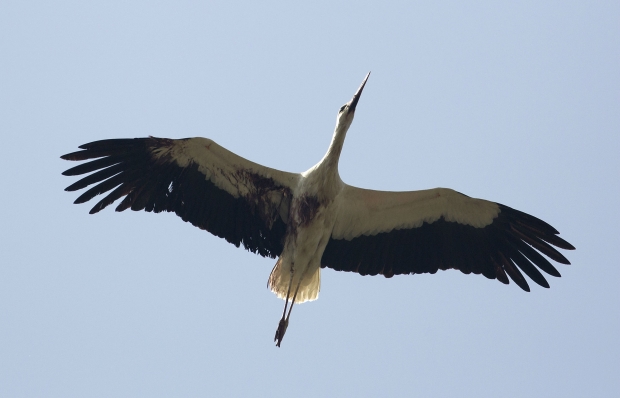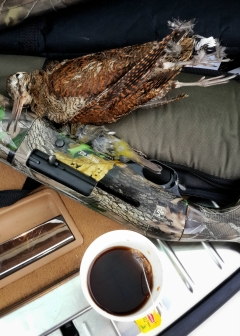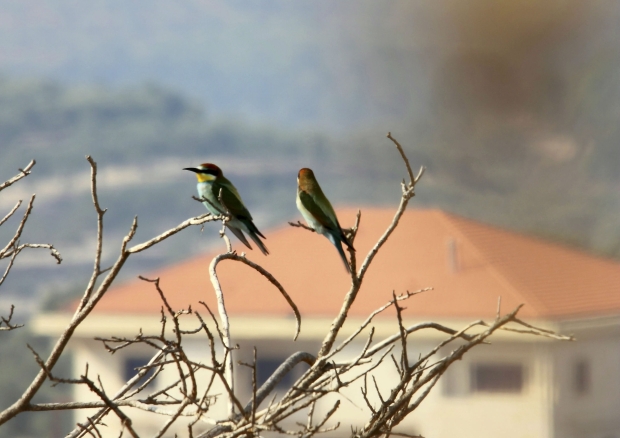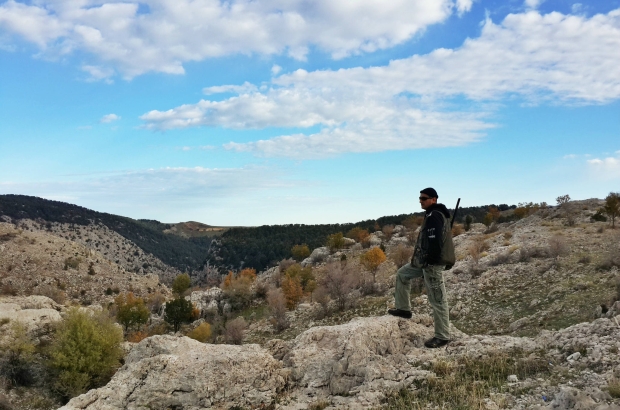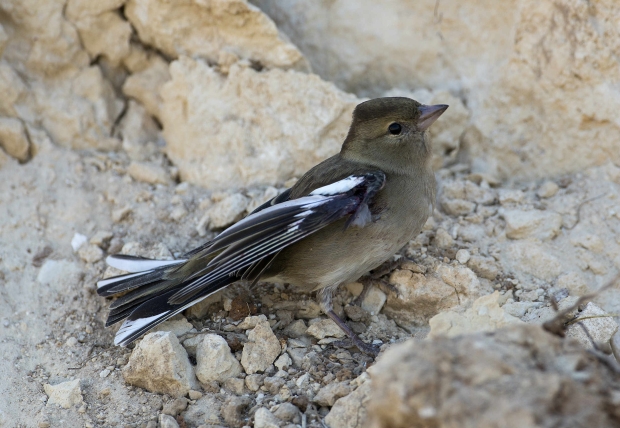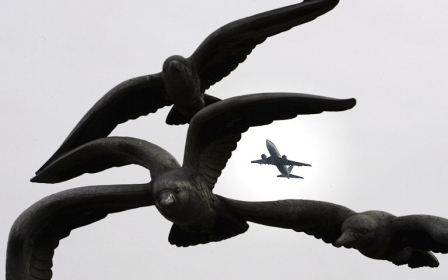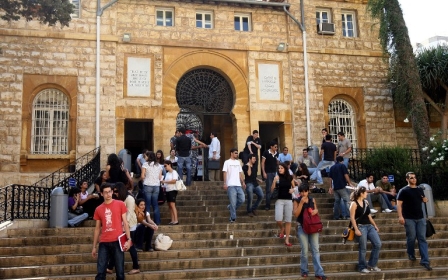Lebanon's hunting season could curb illegal bird 'massacre'
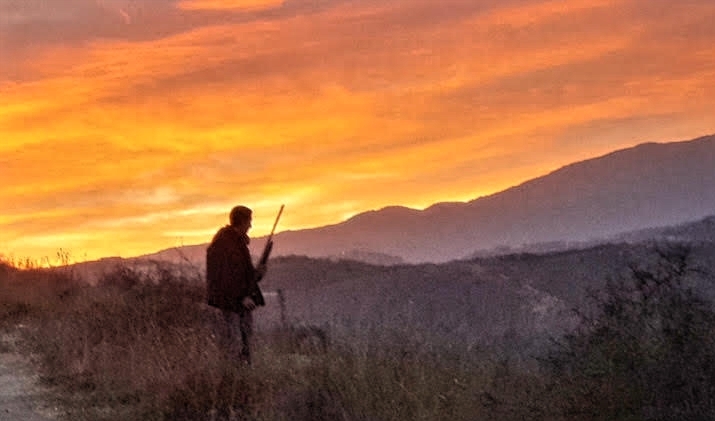
BEIRUT - On a spring day in 1981, Assad Serhal scanned the forest trees of Oklahoma on a mission to find and study the Flicker Woodpecker, the subject of a university research project.
When the fluttering of a bird caught his eye, he raised his binoculars and focused the optics in anticipation. It was not the species he was searching for, but what he found would unexpectedly change his life. A Bobwhite Quail, an otherwise unremarkable game bird, was intently protecting a covey of offspring.
Endangered species are among the estimated 2.6 million birds that are shot or illegally trapped in Lebanon on a yearly basis
As he watched her, she intently positioned herself between her brood and Serhal’s binoculars, as if to shield them from the barrel of a hunter’s firearm.
“Having my binoculars helped me realise the bond between mother and offspring. A feeling [that] never crossed my mind when I used to go hunting,” says Serhal.
From that moment on, at the age of 20, he decided to give up hunting and dedicate his life to the preservation of avian fauna.
He had originally started hunting when he was eight years old, “like most Lebanese males”.
Serhal, who grew up in Lebanon and spent time studying abroad, returned in 1983 after training with the Bronx Zoo in New York.
In Lebanon, these migrations have sustained the growth of a widespread hunting industry that has remained largely unregulated for decades. Excessive and unlawful hunting practices make the country one of the most dangerous areas for travelling birds that often journey thousands of miles to roost and mate.
These include endangered species, which are among the estimated 2.6 million birds that are shot or illegally trapped in Lebanon on a yearly basis.
'Only 10 percent of people carrying arms and going hunting will abide by this law due to the financial implications and due to the fact that most of them do not care about the law at all'
But in an effort to curb rampant poaching activities, Lebanon is set to officially open its hunting season for the first time since the mid 1990s, when the sport was banned by the government.
To prepare for the opening of the hunting season, President Michael Aoun has launched a campaign to raise awareness of the plight of migratory birds and the minister of environment, Tarek Khatib, approved the year’s first hunting licences on 19 June.
According to proponents, this seemingly counterintuitive policy could help to conserve bird populations by narrowing and controlling the window of opportunity available to hunters.
A new era
Under Serhal’s directorship, the Society for the Protection of Nature in Lebanon (SPNL), which works to conserve species of birds and wildlife, has been advising the Ministry of Environment on its hunting policies.
“The main complaint was from the hunters communities that they were banned from practising their legal rights for 20 years and that’s why [there was] the illegal killing of birds everywhere all the time. Just the ban was kind of like forcing people to hunt for the illegal birds,” says Serhal.
Due to the efforts of SPNL, Bird Life International and other civil society groups, the newly enacted hunting law 580 is now set to kick off the hunting season on 15 September, which will last until the end of January 2018, according to Serhal.
“It impacts a lot of hunters, a lot of ethical hunters, because as hunters we wait for a certain season to go out and hunt in remote areas, but with hunting being prohibited in Lebanon, we were constantly looking over our shoulders for police,” says Saad.
“Besides the law-enforcing arena of this, there are a lot of, really, kids going hunting. There are a lot of kids, 12 years old and 14 years old kids, carrying firearms and going hunting and we have plenty of accidents each year, people being killed because of silly mistakes made by amateur hunters or people who don’t know really how to hunt or where to hunt,” Saad adds.
Mixed reviews
The revised hunting law 580 is attempting to tackle some of these issues, and introduces a number of requirements designed to increase hunter safety and minimise risk to people and the environment. In order to participate in the hunting season, individuals must apply for hunting licences, which are provided after the applicant has fulfilled several qualifications.
Eligible hunters must be at least 18 years of age, pass a written exam covering gun safety and environmental awareness, in addition to passing a practical exam with their firearm, which must itself be registered.
These exams can only be taken at approved ranges and getting to one may require applicants to travel significant distances. Furthermore, insurance must also be purchased in the event that someone is accidentally injured on the hunt. A hunting license for birds costs $66, and $100 for mammals.
Following decades of unregulated hunting, the sudden imposition of Law 580’s licencing requirements and related costs could prove hard to stomach for many Lebanese hunters.
“I would say 10 percent of people carrying arms and going hunting will abide by this law due to the financial implications of this law and due to the fact that most of these people do not care about the law at all.
"So unless we really see very hard and strict measures in applying this law on the ground, nothing will actually change,” observes Saad.
Those found violating the law face jail sentences and fines of up to $663 for those found guilty of stealing bird's nests, eggs or baby birds, according to the police.
'No one used to hunt chaffinch but now if they even see a feather flying they shoot at it. It’s a massacre happening'
Henri Bou Obeid, an environmental engineer, organic farmer and passionate hunter, believes the new law is a good starting point but should be refined to allow hunting as early as August.
“There are some kinds of birds that could be shot and are hunted traditionally in Lebanon at the Saint Mary, 15 August in Lebanon and it’s a good period to start hunting,” says Obeid.
“The decision of 15 September was made because other birds [that are] available start [migrating on] 15 August that should not be shot. To better protect them, they pushed the start [of the season] to 15 September but this has not been accepted by many Lebanese hunters.”
“When it migrates it comes with many other similar birds that are not allowed to be hunted… Today in Lebanon many hunters do not make the difference between the chaffinch, which is allowed and could be hunted, and the other birds. So they will hunt all these similar birds, which is not good,” says Obeid.
In the absence of regulation
The opening of the new season comes at a time of increasing hunting activity, which has grown in popularity over the last generation, hunters say.
Toni Mdawar has been hunting in Lebanon for 35 years and says that hunting was well regulated and limited mainly to the verdant Beqaa Valley in east Lebanon before the start of the Lebanese civil war in 1975.
Since then, the absence of law enforcement has led to an upsurge in banned hunting and trapping practices throughout the country.
The National Ecological Survey and Reform (NESR), a local NGO that protects natural resources and wildlife, has been monitoring these illicit activities.
Once, after she had escorted an unlawful bird trapper to a police station, she was abducted by a politician's armed body guards who threatened her into dropping the charges
According to NESR president Lara Haddad, the most common and pernicious methods include the use of nets with "sound machines" that lure birds by replaying their call or coating the branches of trees with an adhesive substance that stick birds to where they land.
Many hunters hope that law 580 can restore order to Lebanon’s hunting sector, but Haddad predicts that insufficient enforcement capacities and government corruption could render the law defunct.
“[The law], it is good, but it’s not realistic because we don’t have much personnel to enforce this law. We don’t have the staff yet and we’re not ready for it. It takes time and it takes lots of financial support and now hunting is facing, especially, the corruption,” explains Haddad.
“During my monitoring role I was exposed to danger by gangsters, they kidnapped me and they are from my same surroundings… So everywhere, even in any region where we have a deputy or any minister, there are gangsters that are hunting or they practise any action against nature, we cannot stop it. This is our problem,” laments Haddad.
Now, with the year’s first hunting licences already approved and September fast approaching, the government has a long way to go to ensure law 580 can make a meaningful impact for both hunters and birds alike.
This article is available in French on Middle East Eye French edition.
New MEE newsletter: Jerusalem Dispatch
Sign up to get the latest insights and analysis on Israel-Palestine, alongside Turkey Unpacked and other MEE newsletters
Middle East Eye delivers independent and unrivalled coverage and analysis of the Middle East, North Africa and beyond. To learn more about republishing this content and the associated fees, please fill out this form. More about MEE can be found here.


